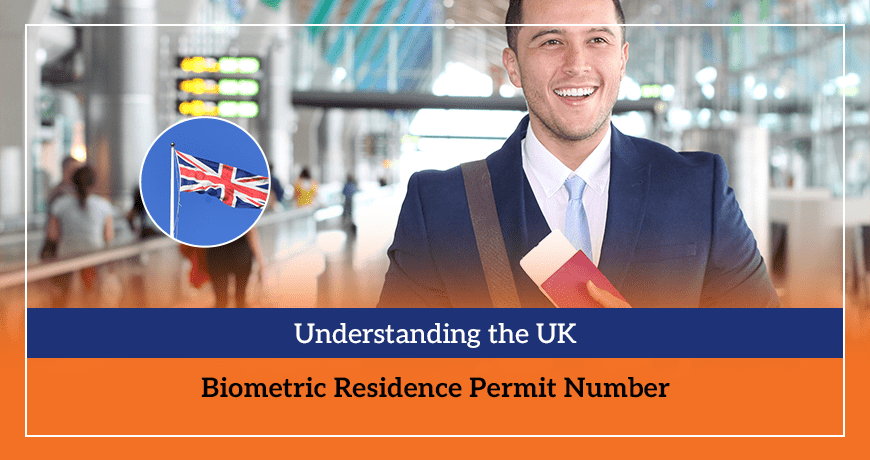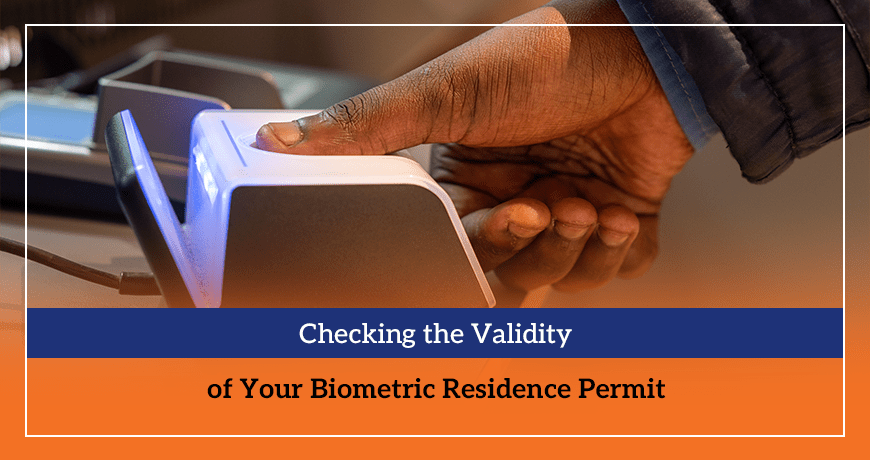If you're a foreign national planning to stay in the UK for a while, you'll need to get a Biometric Residence Permit (BRP). But, what is Biometric Residence Permit? Think of it as your passport to living, working, and enjoying all the UK offers. A BRP is more than just a fancy card; it's your official stamp of approval, a tangible proof of your right to live, work, and enjoy the perks of being a UK resident.
Without a BRP, you'll have difficulty doing the things that make life in the UK. Applying for a BRP is straightforward. You'll need to fill out an online form, provide some documents, and attend an appointment to get your fingerprints and picture taken. Let's dig a little deeper and learn about it in detail.
How to Apply for a Biometric Residence Permit
UK Biometric Residence Permit Application Process
The UK Biometric Residence Permit application process is designed to be secure and efficient. The process is as follows:
- Check your eligibility: Your first step is to check whether you are eligible for a BRP. You can do it on the UK government website.
- Gather your documents: You must gather several documents to support your application. These documents can include your passport, visa, proof of accommodation, and proof of financial means.
- Complete the online application form: The online application form is available on the UK government website. It requires your personal details, contact information, and immigration history.
- Attend a biometric appointment: Once you have submitted your online application form, you will need to attend a biometric appointment. At this appointment, you'll have your fingerprints and a photograph taken.
- Submit your application: Once you have attended your biometric appointment, you must submit your application.
- Receive your decision: The UK Visas and Immigration (UKVI) will assess your application and decide within 8 weeks. If your application is successful, you'll be issued with a BRP.
Biometric Residence Card vs Biometric Residence Permit (BRC vs BRP)
A Biometric Residence Card (BRC) is a type of BRP issued to EEA nationals residing in the United Kingdom before the end of the Brexit transition period. BRCs are no longer being issued but are still valid for travel and work in the UK.
A Biometric Residence Permit is issued to non-EEA nationals in the UK. BRPs are valid for various lengths of time, depending on the type of visa that the holder has.
Applying for a BRP Online
"Where can I do my biometric residence permit?" is a common question among applicants. You can apply for biometric card online on the UK government website. The online application form is available in many languages.
To apply for a BRP online, you will need to:
- Create a profile on the UK government website
- Complete the online application form
- Upload your supporting documents
- Pay the application fee
- Attend a biometric appointment
BRP Application Form and Required Documents
The BRP application form will ask you for a variety of information, including your personal details, contact information, and immigration history.
You will also need to provide some supporting documents with your application. These documents can include:
- Your passport
- Your visa
- Proof of accommodation
- Proof of financial means
- A letter from your employer

Understanding the UK Biometric Residence Permit Number
What Is a Biometric Residence Permit Number?
A Biometric Residence Permit (BRP) number is a unique identifier assigned to a BRP cardholder. It is a 13-digit number printed on the front of the BRP card. The BRP number is used to identify the cardholder and to verify their immigration status in the UK.
Importance of BRP Number
The BRP number is pivotal in various aspects of a foreign national's life in the UK. It works as a key reference point for:
- Identification Verification
- Online Services
- Travel Authorization
- Employment and Benefits
How to Locate Your BRP Number
Your BRP number is printed on the front of your BRP card. It is located in the top right-hand corner of the card. The number starts with two letters, followed by one or two digits, and then six digits. For example, a BRP number might look like this: AB1234567890.
In addition to being printed on the front of your BRP card, your BRP number is also included in the email you received when your BRP was issued. You can also find your BRP number on the UK government website if you have created an online account.
Renewing a Biometric Residence Permit
Biometric Residence Permit Renewal Process
If you are a non-EEA national and your Biometric Residence Permit expires, you must renew it to continue living in the UK. The BRP renewal process is straightforward and can be completed online or by post.
Here are the steps involved in renewing your BRP:
- Check your eligibility: The first step is to check whether you can renew your BRP. You can check your eligibility on the UK government's website.
- Gather your documents: You must gather several documents to support your renewal application. These documents can include your passport, BRP, proof of accommodation, and proof of financial means.
- Complete the online application form: The online application form is available on the UK government website. The form will ask you for a variety of information, including your personal details, contact information, and immigration history.
- Attend a biometric appointment: Once you have submitted your online application form, you will need to attend a biometric appointment. At this appointment, you will have your fingerprints and a photograph taken.
- Submit your application: Once you have attended your biometric appointment, you must submit your application. You can submit it online or by post.
- Receive your decision: The UK Visas and Immigration (UKVI) will assess your application and make a decision within 8 weeks. If your application succeeds, you will be issued a new BRP.
Eligibility for Renewal
You are eligible to renew your BRP if you are a non-EEA national and your BRP is still valid. Plus, you must meet the following:
- You must have been granted ILR in the UK.
- You must have been a continuous resident in the UK for the past two years.
- You must not have been convicted of a crime with a sentence of imprisonment of four months or more.
Application for BRP Renewal
You can apply to renew your BRP online or by post. The online application form is available on the UK government website. The fee to renew your BRP is £193.50.
Renewal Timeline and Requirements
The BRP renewal process typically takes 8 weeks. However, it may take longer if your incomplete application or UKVI requires further information.
Here are the documents that you will need to provide with your BRP renewal application:
- Your current BRP
- Your passport
- Proof of accommodation
- Proof of financial means
- A letter from your employer

Checking the Validity of Your Biometric Residence Permit
How to Verify the Validity of a BRP
There are two main ways to verify the validity of your BRP:
- Check the expiry date: The expiry date of your BRP is printed on the front of the card. If your BRP has expired, you need to apply for a new one.
- Use the online BRP validity check: You can use the UK Visas and Immigration (UKVI) website to check the validity of your BRP online. To do this, you must enter your BRP number and date of birth.
Importance of Checking BRP Expiry Date
It's essential to check the expiry date of your BRP regularly because:
- If your BRP has expired, you are no longer legally entitled to live in the UK. It means you could be fined or even deported.
- You may be unable to travel outside the UK if your BRP has expired. It's because many countries require a valid visa to enter.
- You may not be able to access certain benefits if your BRP has expired. It includes things like healthcare and social security.
Using the Online BRP Validity Check
The online BRP validity check is an easy and quick way to check the validity of your BRP. To use the check, you will need to:
- Go to the UKVI website.
- Hit the "Check your biometric residence permit" button.
- Put your BRP number and date of birth.
- Click on the "Check" button.
The website will tell you whether your BRP is valid or not. If your BRP is invalid, the website will also tell you why and what you need to do to rectify the situation.
Biometric Residence Permits (BRPs) Expiring on December 31, 2024
Historical Background of BRP Expiry Dates
Biometric Residence Permits (BRPs), introduced in 2008, have primarily served as physical documents evidencing an individual's right to reside and work in the UK. Initially, BRPs were issued with varying expiry dates depending on the visa category. However, in 2019, the UK government decided to standardize BRP expiry dates to December 31, 2024.
EU Requirements and Next-Generation Encryption Technology
The standardization of BRP expiry dates stemmed from the European Union's (EU) security regulations requiring the incorporation of next-generation encryption technology into residence documents. This technology, known as 'Document Security Standards (DSS) 2019,' enhances the security and integrity of residence permits.
Impact on BRP Holders and Leave to Remain
The December 31, 2024, expiry date for BRPs does not affect an individual's underlying immigration status or leave to remain in the UK. Individuals granted indefinite leave to remain (ILR) or other visas authorizing long-term residence in the UK will continue to hold these statuses even after their BRPs expire.
Home Office's Decision to Continue Short-Dating BRPs
Despite the EU's withdrawal from the UK, the Home Office continued issuing BRPs with the December 31, 2024, expiry date. This decision was motivated by several factors, including the need to align with existing visa validity periods and the transition to a digital immigration status verification system.
Transition to Online Access and Future Plans for BRPs
The future of BRPs remains under discussion, with the Home Office considering various options, including introducing digital BRPs or entirely abolishing the physical card. The decision will likely depend on the effectiveness of the online 'View and Prove' system and the evolving landscape of immigration document security standards.
Also Read:

Frequently Asked Questions
How Long Does It Take to Receive a Biometric Residence Permit After Applying?
The processing time for BRP applications depends on the visa category and whether you are applying from within or outside the UK. Generally, you can expect to receive your BRP within 7 to 10 days after your application is approved.
Can I Travel Outside the UK with a Biometric Residence Permit?
Yes, you can travel outside the UK with a valid BRP. However, you should always check the entry requirements of the country you are visiting. Some countries may require a visa in addition to your BRP.
What Should I Do If I Lose or Damage My BRP?
If you lose or damage your BRP, immediately report it to the Home Office. You can do this online or by calling the BRP helpline. You will need to pay a fee to replace your BRP.
How Do I Update My Biometric Residence Permit with Change of Address?
You can update your BRP details, including your address, online or by calling the BRP helpline. There is no fee to update your BRP details.
Is there a Fee for Renewing a Biometric Residence Permit?
Yes, there is a fee for renewing a BRP. The fee depends on the visa category.
What Are the Consequences of Overstaying on a Biometric Residence Permit?
Overstaying on a BRP is a severe immigration offense. If you overstay, you may be fined, detained, or deported. You may also have difficulty gaining entry to the UK in the future.
Are There Any Restrictions on Employment with a BRP?
The restrictions on employment with a BRP depend on the visa category. Some BRPs allow you to work without restrictions, while others may restrict the type of work you can do or the amount of time you can work.
How Do I Report a Stolen or Lost Biometric Residence Permit?
If your BRP is stolen or lost, you must report it to the police as soon as possible. You should also report it to the Home Office.
Can Family Members Apply for a BRP Under My Status?
Yes, family members of certain BRP holders may be able to apply for a BRP based on their status. The eligibility criteria depend on the visa category.
Can I enter the UK without my BRP?
If you are a BRP holder, you are not required always to carry your BRP. However, you may be asked to show your BRP to a Border Force officer when you enter the UK.
Conclusion
In conclusion, Biometric Residence Permits are essential documents for individuals residing in the UK. However, the Home Office is transitioning to a digital immigration status verification system, and the future of physical BRPs is uncertain. So, you must stay informed about BRP updates and seek legal advice when needed.